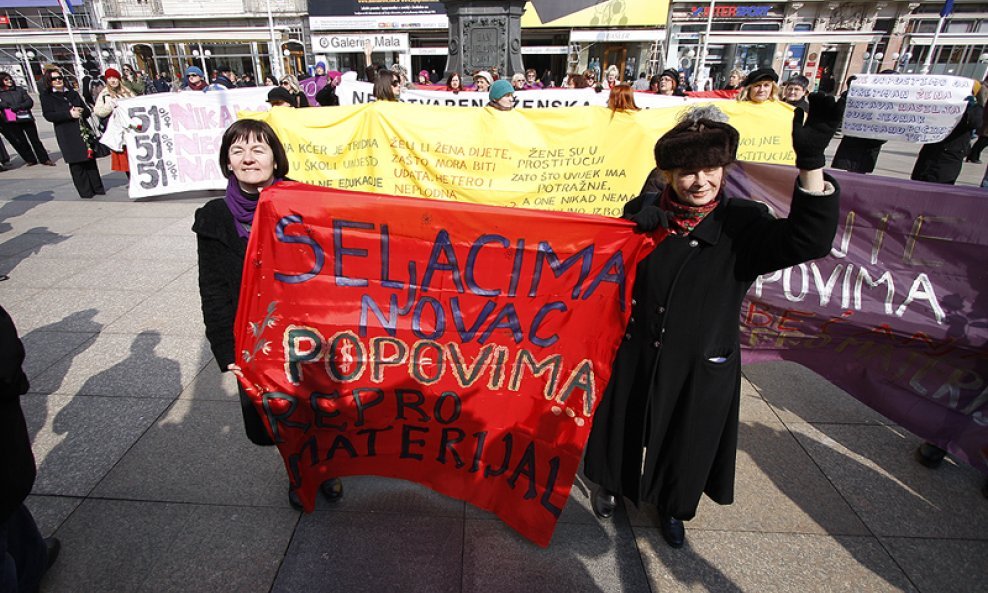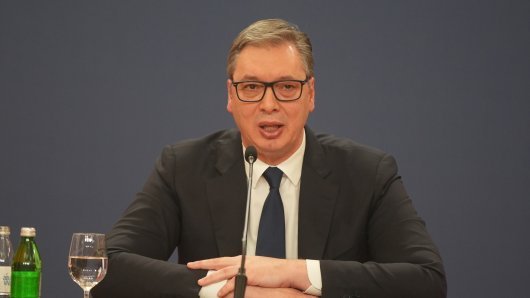The Croatian Women's Network on Monday marked International Women's Day with a protest walk in downtown Zagreb, demonstrating solidarity with the global women's movement and women all over the world and pointing to problems of women in Croatia.
Participating in the walk were some 50 activists of women's associations who warned about gender inequality and numerous problems encountered by women in Croatia.
"We are here to point to the growing unemployment of women, their poor position on the labour market, the entirely forgotten rural women... and the mistakes of current politics which affect women," said the coordinator of the network, Bojana Genov.
She added that she expected from Prime Minister Jadranka Kosor to make gender-conscious decisions, to see to it that the budget was gender-conscious, and to demonstrate gender equality with deeds.
"The Prime Minister has demonstrated a sensitivity no one has shown before, but we expect it to be backed with deeds, to reflect on the budget," said Genov.
One of the burning problems of women in Croatia are their labour rights because women continue to be paid less than men for the same type of work, and their salaries amount to 89 percent of salaries received by men doing the same job, she said.
Also, women today work with fixed-term contracts for a dozen years, she said, calling for limiting the number of years of fixed-term employment.
She believes that rural women are the most underprivileged because their problems are not discussed at all.
Sexual education in schools is entirely neglected, which leads to an increase in teenage pregnancies, Genov said, adding that the Church has too great influence in the Croatian society which considers itself secular.
The protest walk of the Women's Network was joined by a member of parliament Sime Lucin of the Social Democratic Party.
The Ministry of Family Affairs, War Veterans and Inter-generational Solidarity today organised a round table discussion called "Equal rights, Equal Opportunities" on the occasion of International Women's Day.
Legislation in Croatia today provides women with equal rights and gender equality, however, in practice, on the labour market, women are still under-represented in all areas where decisions are made about power and money, it was said at the event.
Gender Equality Ombudswoman Gordana Lukac Koritnik pointed to the poor representation of women in successful companies and in the national parliament.
Gordana Sobol, chair of the Parliament's Committee on Gender Equality, pointed to the under-representation of women at all decision-making levels, both in politics and in the business sector.
She said that the 2008 Gender Equality Act envisaged 40-percent participation of women in all decision-making bodies.
Sobol said that women accounted for only 24 percent of members of parliament, and that in the last ten years the share of women in the national parliament had grown only two percent.
She added that after the last elections, the situation at the local level had slightly improved, that women were still mostly participating in the work of town and county councils and assemblies, but that there were almost no women in the executive authorities.
"Even though Croatia is one of the few countries that has a woman Prime Minister, there are few women in ministerial positions, and in positions of county prefects, mayors and municipal heads," Sobol said, adding that in the business sector 77 percent of managers were men.
Gender Equality Ombudswoman Lukac Koritnik said one of the reasons for gender inequality was the national education system, which she said was not adjusted to the labour market and led to the segregation of women.
































